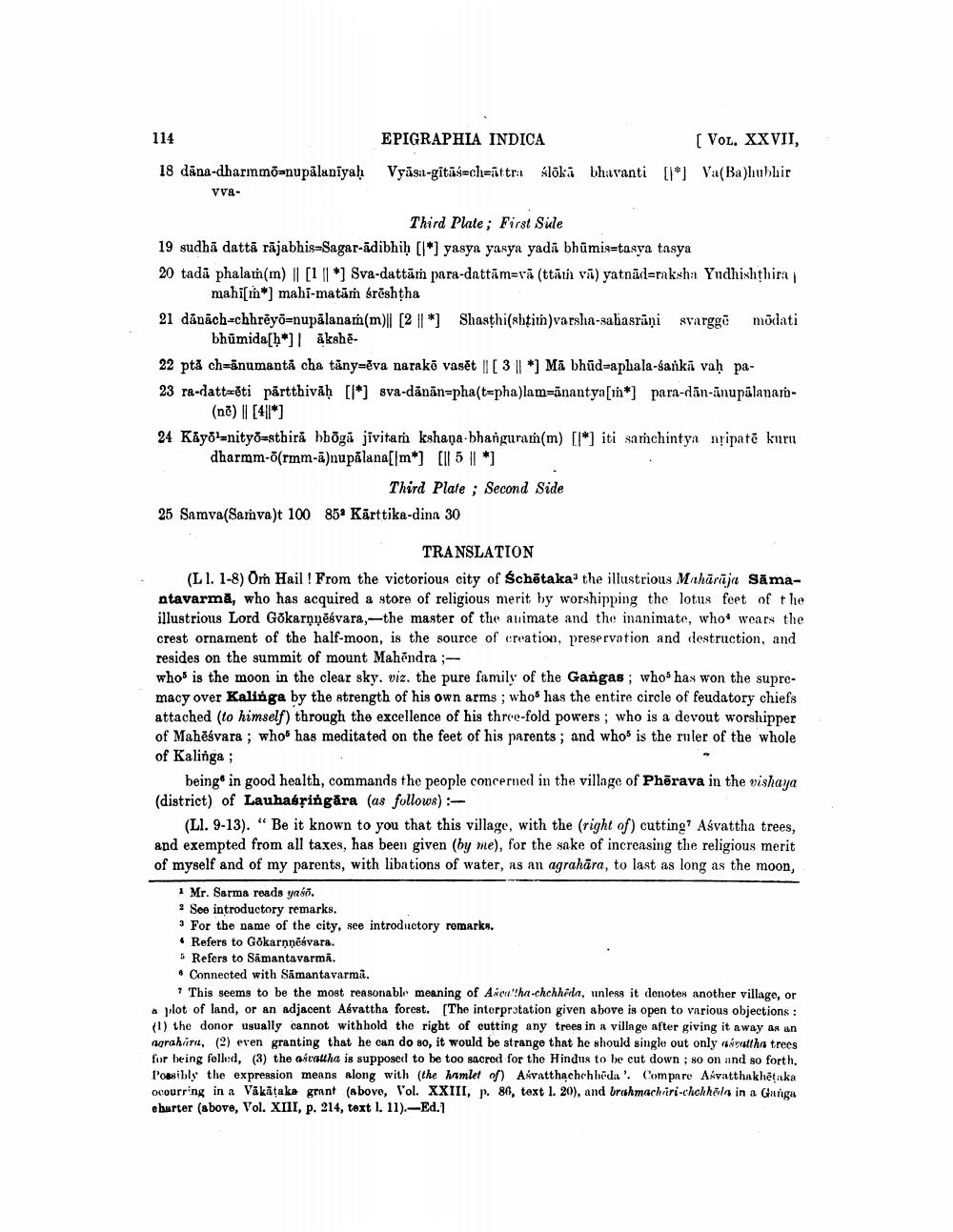________________
114
EPIGRAPHIA INDICA
[VOL. XXVII,
18 dana-dharmmō-nupalaniyaḥ Vyasa-gitas-ch-ättra ślōka bhavanti [*] Va(Ba)hubhir
vva
Third Plate; First Side
19 sudha datta rajabhis-Sagar-adibhiḥ [*] yasya yasya yada bhumis-tasya tasya
20 tadi phalath(m) || [1 || *] Sva-dattāṁ para-datṭāmevā (tṭāṁ vā) yatnād-raksha Yodhishtira mahi[m] mahi-matām śreshṭha
21 danich-chhrey&-nupālanaṁ(m)|| [2 || Shasthishi)varsha-sahasrani wangg modati bhumida[b]| akshē
22 ptă ch-anumanta cha tany-ēva narakō vasēt || [ 3 || *] Mā bhūd-aphala-śankā vaḥ pa
23 ra-datt-ti pärtthiväḥ [1] ava-dânân-pha(t-pha)lam-änantys[*] para-din-upâlanarb (ně) || [4||*]
24 Kay1nity-thirů hhög jivitaṁ kshana-bhangarath(m) [] iti samchintya sripatë kuru dharmm-3(rmm-a)nupālana[m] [5]
Third Plate; Second Side
25 Samva(Samva)t 100 85 Kärttika-dina 30
TRANSLATION
(L1. 1-8) Om Hail! From the victorious city of Schotaka3 the illustrious Mahārāja Sāmantavarma, who has acquired a store of religious merit by worshipping the lotus feet of the illustrious Lord Gokarņņēśvara,-the master of the animate and the inanimate, who wears the crest ornament of the half-moon, is the source of creation, preservation and destruction, and resides on the summit of mount Mahendra;
who is the moon in the clear sky, viz. the pure family of the Gangas; who has won the supremacy over Kalinga by the strength of his own arms; who has the entire circle of feudatory chiefs attached (to himself) through the excellence of his three-fold powers; who is a devout worshipper of Maheśvara; who has meditated on the feet of his parents; and who is the ruler of the whole of Kalinga
being in good health, commands the people concerned in the village of Phērava in the vishaya (district) of Lauhasṛingāra (as follows):
(Ll. 9-13). "Be it known to you that this village, with the (right of) cutting" Asvattha trees, and exempted from all taxes, has been given (by me), for the sake of increasing the religious merit of myself and of my parents, with libations of water, as an agrahara, to last as long as the moon,
1 Mr. Sarma reads yaso.
2 See introductory remarks.
3 For the name of the city, see introductory remarks.
Refers to Gokarnņēśvara.
5 Refers to Samantavarmā.
• Connected with Samantavarmā.
This seems to be the most reasonable meaning of Ascu!ha-chchheda, unless it denotes another village, or a plot of land, or an adjacent Aévattha forest. [The interpretation given above is open to various objections: (1) the donor usually cannot withhold the right of cutting any trees in a village after giving it away as an agrahāra, (2) even granting that he can do so, it would be strange that he should single out only asrattha trees for being felled, (3) the aśvattha is supposed to be too sacred for the Hindus to be cut down; so on and so forth. Possibly the expression means along with (the hamlet of) Asvatthachchheda'. Compare Akvatthakhēṭaka ocourring in a Vākāṭaka grant (above, Vol. XXIII, p. 86, text 1. 20), and brahmachari-chchhēda in a Ganga eharter (above, Vol. XIII, p. 214, text l. 11).-Ed.1




